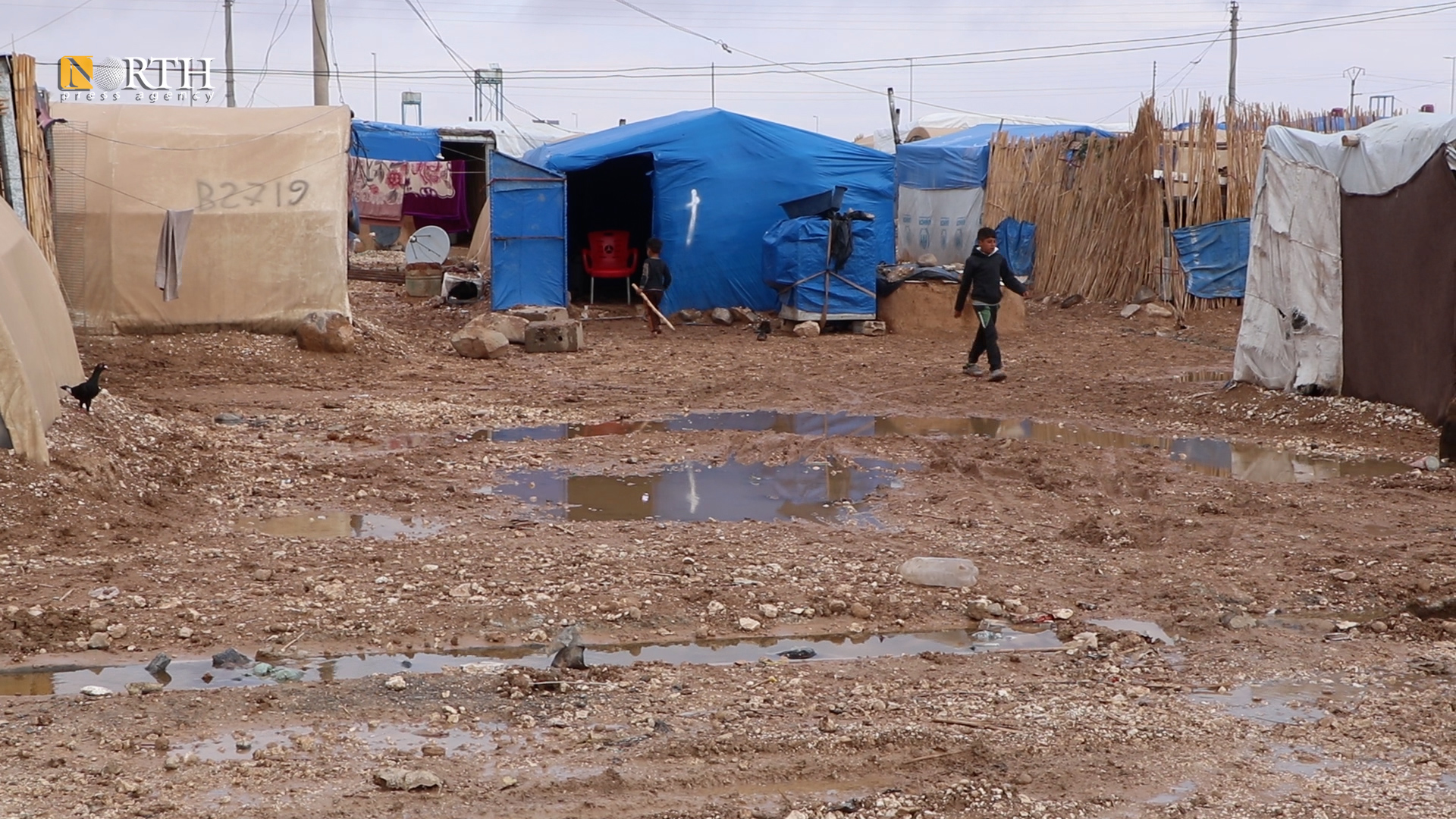HASAKAH, Syria (North Press) – Rima Muhammad, 48, takes out wet mattresses, blankets and clothes and displays them in the sun to get dried. Rima is a woman who displaced from Sere Kaniye (Ras al-Ain) and resides in Washokani squatter camp in the west of Hasakah governorate, northeastern Syria.
“Rain water swept into my tent and all of my mattresses and blankets get wet. I do not know if they will get dried when the night falls or not. I hope so,” Muhammad said.
Speaking to North Press and carrying one of her children, Muhammad added that their conditions in the squatter camp worsen as rains start to fall, “I do not know how we will spend this winter”.
Suffering of the Internally Displaced Persons (IDPs) have increased inside the camp when it first started to rain causing mud to make movement difficult among tents specially for the children. In addition, the rain water damaged their tents and deprived the IDPs from sleep at night.
Washokani Camp was found in 2019 and shelters 2,324 IDP families from Sere Kaniye and its countryside.
In October 2019, the Turkish forces and their affiliated Syrian opposition factions launched a ground and areal offensive on Tel Abyad and Sere Kaniye through which they invaded the two areas and caused the displacement of more than 300,000 people, according to statistics by the Autonomous Administration of North and East Syria (AANES).
The IDPs were distributed on Tel al-Samen Camp in Raqqa, Washokani and Arishah camps in Hasakah, Newroz Camp in Derik city, and other IDPs preferred to live in cities and villages under the control of the AANES.
Insufficient diesel
When winter comes, some of the IDPs start to repair shattered parts of the tents with old clothes they had or filling them with nylons to stop rain water from entering inside.
The IDPs in the camps complain their shares of diesel that they are insufficient as each family gets 40 liter every ten days.
Muhammad pointed out that they light the heating stove during the day fearing her four children will get sick. Plus her husband’s health condition requires constant heating.
“The share of diesel we get is too little. Sometimes we are forced to buy diesel from the market inside the camp and when we have no money to buy it, we remain without heating.”
The IDP woman sighed and recalled the old days prior to displacement, “all we want is to return to our homes. At home, we did not care if rain fell nor we suffered, on the contrary we used to say rain brings goodness.”
The majority of the United Nations High Commissioner for Refugees (UNHCR) organizations and scores of other organizations functioning in northeast Syria stopped supporting the camp claiming they have no recognition, according to the camp’s management.
Riyad Mare’i, an official in Washokani Camp, said they tried to pressure the organizations operating in the camp in order to deliver some aid to the IDPs but the response was not as required. He pointed that the few numbers of organizations operating in the camp and delivering limited aid, which is one food basket to a 4-member family every two months, have aggravated the condition of the IDPs.
Tragic situation
Sheikhmous Ahmad, co-chair of the Office of Refugees and Displaced Affairs of the AANES, said the conditions in the camps are tragic. There is acute shortage in humanitarian assistance due to the closure of border crossings and the limitedness of the AANES.
Almost two years ago, al-Ya’rubiyah (Tel Kochar) crossing between Syria and Iraq was closed due to a Russian veto and so, entry of the humanitarian aid were limited only through Bab al-Hawa border crossing which is located on the Syrian-Turkish border.
“Tents in the Washokani Camp need to be renewed ,blankets and mattresses need to be renewed, too. Besides, the camp lacks medical equipment and kinds of some medicines for the chronic illnesses,” Ahmad added.
Salma al-Aboud, 26, a displaced woman from Sere Kaniye, lives a situation no different from others. Rain water swept into her tent as well.
Covering her face with a scarf due to cold, al-Aboud said that large amounts of water swept into the tent and everything got wet.
“Living here is too terrible. We are compelled to live here due to the invasion of our lands.”
Anoud al-Khalaf, 39, another IDP woman complains the shortage of aid delivered in the camp.
“In the past, we used to get 40 liters of diesel every seven days, but now we get the same amount every ten days. And the food basket is distributed every two months instead of one month.”
Al-Khalaf is unable to afford heating diesel and other items from the market as her living conditions is not so good. “We only survive on this aid that are not enough”.

